Toyota Yaris VS Volvo XC90 – Specs, Efficiency & Price Comparison
Which model is the better choice – the Toyota Yaris or the Volvo XC90? We compare performance (280 HP vs 455 HP), boot capacity (286 L vs 302 L), efficiency (3.80 L vs 1.20 L), and of course, the price (21900 £ vs 68500 £).
Find out now which car fits your needs better!
The Toyota Yaris (Hatchback) is powered by a Full Hybrid or Petrol engine and comes with a Automatic or Manuel transmission. In comparison, the Volvo XC90 (SUV) features a Petrol MHEV or Plugin Hybrid engine and a Automatic gearbox.
When it comes to boot capacity, the Toyota Yaris offers 286 L, while the Volvo XC90 provides 302 L – depending on what matters most to you. If you’re looking for more power, you’ll need to decide whether the 280 HP of the Toyota Yaris or the 455 HP of the Volvo XC90 suits your needs better.
There are also differences in efficiency: 3.80 L vs 1.20 L. In terms of price, the Toyota Yaris starts at 21900 £, while the Volvo XC90 is available from 68500 £.
Compare all the key specs now and find out which model fits your lifestyle best!
Toyota Yaris
The Toyota Yaris exudes a charming blend of practicality and style, making it an appealing choice for urban drivers. Its compact design allows for easy manoeuvrability in crowded city streets, while the interior offers a surprisingly spacious and comfortable environment. With a focus on fuel efficiency and reliability, the Yaris remains a popular option for those seeking a balance between performance and economy.
details @ Toyota
@ Toyota
 @ Toyota
@ Toyota
Volvo XC90
The Volvo XC90 stands out with its elegant Scandinavian design, seamlessly blending luxury with versatility. Inside, it offers a spacious and meticulously crafted interior, showcasing high-quality materials and advanced technology. The vehicle provides a comfortable and smooth driving experience, making it a popular choice for families and long journeys.
details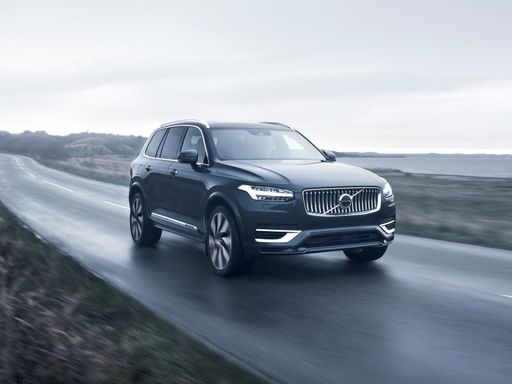 @ media.volvocars.com
@ media.volvocars.com
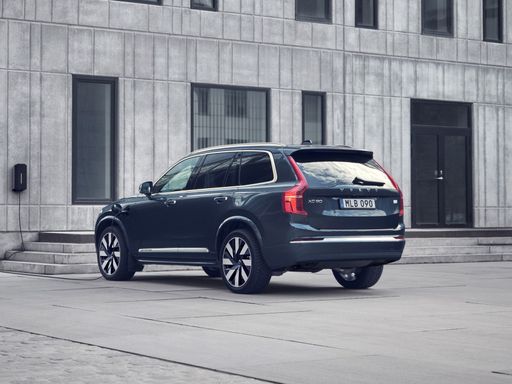 @ media.volvocars.com
@ media.volvocars.com
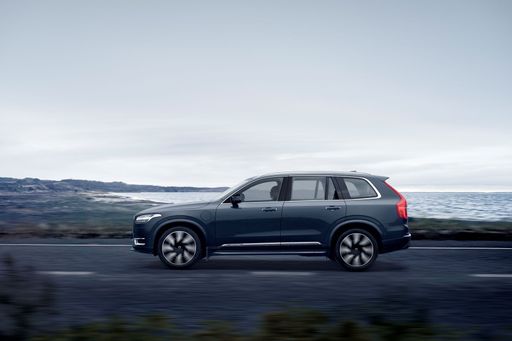 @ media.volvocars.com
@ media.volvocars.com
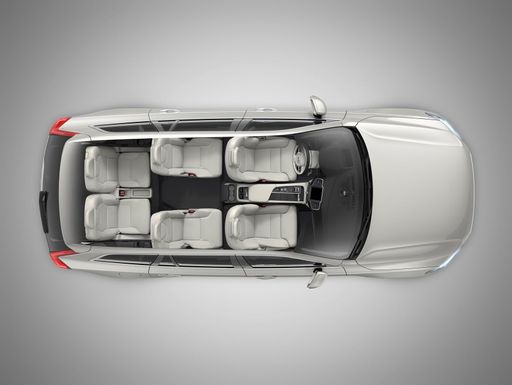 @ media.volvocars.com
@ media.volvocars.com
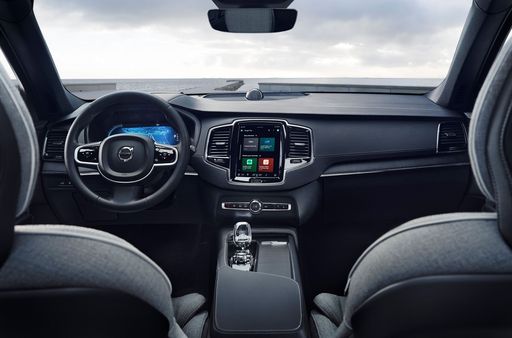 @ media.volvocars.com
@ media.volvocars.com

|

|
|
|
|
Costs and Consumption |
|
|---|---|
|
Price
21900 - 45000 £
|
Price
68500 - 81300 £
|
|
Consumption L/100km
3.8 - 9.5 L
|
Consumption L/100km
1.2 - 8.5 L
|
|
Consumption kWh/100km
-
|
Consumption kWh/100km
-
|
|
Electric Range
-
|
Electric Range
71 km
|
|
Battery Capacity
-
|
Battery Capacity
14.70 kWh
|
|
co2
87 - 215 g/km
|
co2
30 - 191 g/km
|
|
Fuel tank capacity
36 - 50 L
|
Fuel tank capacity
71 L
|
Dimensions and Body |
|
|---|---|
|
Body Type
Hatchback
|
Body Type
SUV
|
|
Seats
4 - 5
|
Seats
7
|
|
Doors
3 - 5
|
Doors
5
|
|
Curb weight
1090 - 1356 kg
|
Curb weight
2080 - 2297 kg
|
|
Trunk capacity
141 - 286 L
|
Trunk capacity
262 - 302 L
|
|
Length
3940 - 3995 mm
|
Length
4953 mm
|
|
Width
1745 - 1805 mm
|
Width
1923 mm
|
|
Height
1455 - 1500 mm
|
Height
1771 mm
|
|
Payload
289 - 525 kg
|
Payload
653 - 710 kg
|
Engine and Performance |
|
|---|---|
|
Engine Type
Full Hybrid, Petrol
|
Engine Type
Petrol MHEV, Plugin Hybrid
|
|
Transmission
Automatic, Manuel
|
Transmission
Automatic
|
|
Transmission Detail
Schaltgetriebe, Automatikgetriebe
|
Transmission Detail
Automatikgetriebe
|
|
Drive Type
Front-Wheel Drive, All-Wheel Drive
|
Drive Type
All-Wheel Drive
|
|
Power HP
116 - 280 HP
|
Power HP
250 - 455 HP
|
|
Acceleration 0-100km/h
5.5 - 9.7 s
|
Acceleration 0-100km/h
5.4 - 7.7 s
|
|
Max Speed
175 - 230 km/h
|
Max Speed
180 km/h
|
|
Torque
390 Nm
|
Torque
360 - 709 Nm
|
|
Number of Cylinders
3
|
Number of Cylinders
4
|
|
Power kW
85 - 206 kW
|
Power kW
184 - 335 kW
|
|
Engine capacity
1490 - 1618 cm3
|
Engine capacity
1969 cm3
|
General |
|
|---|---|
|
Model Year
2024 - 2025
|
Model Year
2024
|
|
CO2 Efficiency Class
B, G
|
CO2 Efficiency Class
G, B
|
|
Brand
Toyota
|
Brand
Volvo
|
Toyota Yaris
Introducing the Next-Gen Toyota Yaris: A Blend of Innovation and Technology
The Toyota Yaris has long been lauded for its efficiency, reliability, and practicality. As we venture into the 2024 model year, Toyota has upped the ante with the latest versions of this popular hatchback, melding cutting-edge technology with eco-conscious design. Here’s an in-depth look at what makes the current Yaris line-up stand out from the crowd.
Efficient Powertrains: Hybrid and Beyond
Spearheading the technological innovation in the Yaris range is the introduction of various hybrid models. The Yaris offers a 1.5-litre full-hybrid engine, marrying a petrol engine with an electric motor to produce between 116 and 130 PS. This power blend is controlled via a sophisticated CVT-gearbox, optimizing both performance and fuel efficiency, with consumption figures ranging from an impressive 3.8 to 4.2 litres per 100 km.
For those seeking pure performance, the GR Yaris variants provide a turbocharged 1.6-litre engine capable of producing 280 PS. This power is delivered via a choice of manual or automatic transmission, giving drivers the tactile involvement or convenience they desire.
Design that Fulfils and Inspires
The Yaris hasn't forgotten its roots as a compact, city-friendly hatchback, measuring between 3,940 and 3,995 mm in length. With its bold front grille, sleek lines, and a choice of striking colours, it's a car that turns heads while remaining perfectly suited for urban environments.
The interior is equally impressive, designed with a focus on driver convenience and comfort. Depending on the variant, Yaris can offer generous cargo space of up to 286 litres, making it a perfect companion for everyday tasks or weekend escapes.
Technological Integration: The Smart Choice
Toyota's approach goes beyond just improving engine technology; the Yaris is packed with innovative features aimed at enhancing the driving experience. It boasts a suite of advanced safety systems such as lane departure alert, pre-collision system, and adaptive cruise control, ensuring peace of mind on the road.
The infotainment system in the Yaris is designed to keep you connected, offering seamless smartphone integration, a user-friendly interface, and an intuitive navigation system, ensuring that you're always informed and entertained.
The Cost of Innovation
Owning a Yaris is not just about impressive technology; it's also about making economic sense. With a price range between €25,500 and €49,990, and monthly costs spanning from €748 to €1,513, it offers a broad spectrum to suit different budget needs.
Concerned about emissions? You can rest easy knowing that the Yaris boasts a CO2 efficiency class ranging from B to G, thanks to its low emissions output of between 87 to 215 g/km.
Conclusion: The Toyota Yaris Drives the Future
The Toyota Yaris continues to be a strong contender in the compact car segment, pushing boundaries with its innovative full-hybrid systems and performance-oriented GR models. It's a remarkable blend of design, technology, and economy, ensuring it remains a top choice for drivers who demand more from their hatchbacks.
Whether you're seeking the efficiency of a hybrid or the thrill of the GR Yaris, there's a model tailored to your unique driving needs in Toyota's latest Yaris lineup.
Volvo XC90
Introduction to the Volvo XC90: The Pinnacle of Swedish Innovation
The Volvo XC90 continues to uphold the Swedish car manufacturer’s reputation for delivering sophisticated and reliable vehicles. Known for its impressive blend of luxury, technology, and safety, the 2024 model year introduces updates that maintain its status as a leading luxury SUV. With options ranging from mild-hybrid to plug-in hybrid variants, the XC90 caters to a diverse array of needs and preferences.
Engine Options and Performance
The Volvo XC90 is available in both petrol mild-hybrid and plug-in hybrid configurations. The mild-hybrid version boasts a robust 250 PS, while the plug-in hybrid variant offers an astounding 455 PS. This range of powertrains ensures that drivers experience both efficient performance and the capability to tackle a variety of driving conditions.
Efficiency and Environmental Responsibility
One of the standout features of the Volvo XC90 is its commitment to environmental efficiency. The plug-in hybrid model achieves a remarkable fuel consumption rate of just 1.2 L/100km and an electric-only range of up to 71 km. These capabilities showcase Volvo’s dedication to reducing carbon emissions and promoting sustainable driving without compromising performance.
Cutting-Edge Safety Features
Volvo cars are synonymous with safety, and the XC90 is no exception. Incorporating advanced safety innovations such as Pilot Assist, City Safety with Autobrake, and Lane Keeping Aid, the XC90 provides drivers with confidence and peace of mind. These systems work together seamlessly to prevent accidents and protect passengers.
Luxurious Interior and Comfort
Step inside the Volvo XC90, and you'll be greeted by a meticulously crafted interior designed for comfort and convenience. The SUV accommodates up to seven passengers with ease, offering a spacious cabin and premium materials. Elegant designs, advanced infotainment technology, and premium sound systems transform every journey into a luxurious experience.
Price and Specifications
The Volvo XC90 is competitively priced, with a range starting from €79,890 up to €94,890, depending on the chosen configuration and features. Its dimensions, with a length of 4953 mm, width of 1923 mm, and height of 1771 mm, provide a substantial presence on the road. The luggage capacity ranges between 262 to 302 litres, allowing for flexibility depending on passenger and cargo needs. Equipped with an automatic transmission and all-wheel drive, the XC90 delivers a smooth and stable ride.
Conclusion: The Epitome of Modern SUV Design
The Volvo XC90 stands out as a top contender in the luxury SUV market, blending advanced technology, unparalleled safety, and luxurious comfort. Whether you choose the fuel-efficient plug-in hybrid or the reliable mild-hybrid version, the XC90 demonstrates Volvo's commitment to innovation and excellence. It remains a favourite among discerning drivers seeking a vehicle that embodies both style and substance.
The prices and data displayed are estimates based on German list prices and may vary by country. This information is not legally binding.
